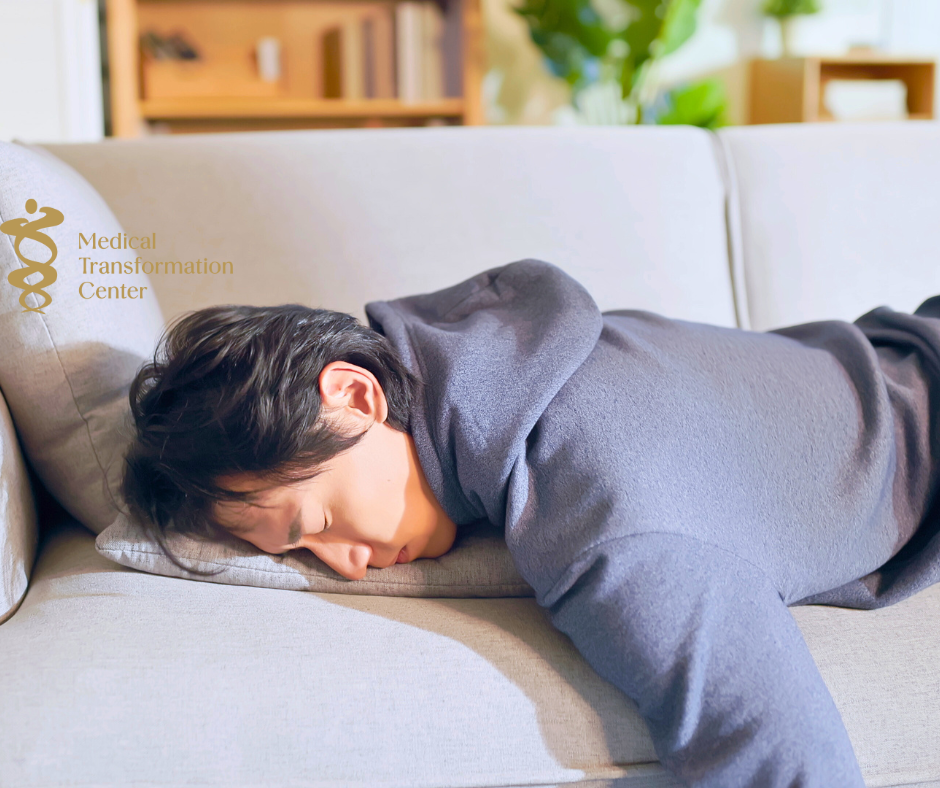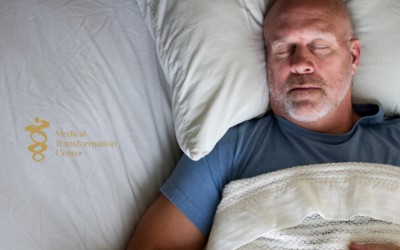While it isn’t unusual to feel tired occasionally, there is a huge difference between feeling fatigued and having chronic fatigue. When your fatigue is chronic, it means that you are consistently feeling tired for at least six months and that there are symptoms associated with your fatigue that are interfering with your daily functioning. At Medical Transformation Center in Louisville, KY we believe that functional medicine can get you back on the right track. For treating chronic fatigue, hormone therapy can be a good option for many people.
How Can Hormone Therapy Help Fix Chronic Fatigue?
Hormone therapy typically refers to bioidentical hormone replacement therapy, or BHRT, which is a series of continual treatments that are used to balance the level of hormones in your body. BHRT is usually a treatment that is given to patients who are experiencing age-related changes in physical and psychological health, including experiencing long-lasting fatigue and the symptoms associated with reduced energy.
Hormone therapy can help fix fatigue by adjusting the levels of hormones in your body to correct the way your metabolic system functions. In other words, because hormones determine the general functional ability of your body, hormone replacement therapy with bioidentical hormones can correct the root cause of fatigue. The reason this treatment is so effective is because of the relationship your hormones have with your overall energy.
Hormones and Your Energy
There are several hormones in your body that are associated with the amount of energy in your body. For example, thyroid hormones, estradiol, progesterone, estrogen, and adrenal hormones like cortisol all contribute to the amount of energy your body produces each day. Many people begin to experience significant deficits in energy levels after the onset of andropause and menopause.
This is because the hormonal changes associated with menopause and andropause alter the amount of hormones produced in your body, which in turn alters the way your metabolism and cellular function are regulated. For example, one of the most important hormones associated with energy for women is estrogen; when estrogen levels are low, it becomes more difficult for the body to maintain a good level of energy throughout the day.
What Causes Chronic Fatigue?
Aside from hormonal imbalance caused by aging or even certain medical conditions, there are other causes for fatigue. In particular, the type of fatigue you are feeling is a significant clue in determining which factors are affecting your energy level the most. For example, if you are physically fatigued, then the cause of your fatigue will be related to physiological stress; if you are emotionally fatigued, on the other hand, then psychological stress may be the most influential factor.
Psychological Stress
Psychological stress is often a root cause of long-term fatigue, particularly when it comes to stress. The way the human body responds to stress is unique. When we are stressed, the body releases stress hormones that eventually cause an “energy crash” once the hormones wear off. And because stress is a psychological response, this means that leading a stressful life can reduce your energy.
Emotional trauma is another common factor for psychological stress. Usually, emotional trauma stems from significant life changes, such as an ended relationship or the death of a loved one. Again, although emotional trauma is psychological, the way the body responds to emotional distress can be incredibly draining. Additionally, those who have psychological disorders or changes in mood, such as depression, may be more prone to long-term fatigue than others.
Physiological Stress
Physiological stress refers to any condition that taxes the body, such as pain, acute injury, or illnesses that drain the immune system, such as viral infections. In fact, viral infections are some of the most common physiological factors associated with developing long-term fatigue because of the way viral infections impose so much stress on the immune system. Having an immune system disorder is another cause of physiological stress that can deplete energy levels.
Physical injury can also be a cause for long-term fatigue. When the body is injured, most of our energy is devoted to healing the injury, which means that we lose the energy that is typically used for other things. For example, people who are healing from major surgery, broken bones, or other injuries are typically more tired than healthy people.
What Are Common Fatigue Symptoms?
To say that fatigue is simply “feeling tired” would be an over-simplification. There are actually several symptoms that are commonly associated with fatigue, particularly when fatigue is chronic. The symptoms most commonly associated with long-term fatigue include:
- Excessive tiredness
- Difficulty sleeping or waking up
- Unrefreshing sleep
- Exhaustion after mental or physical activity
- Headaches
- Poor memory or concentration
- Low mood
- Disinterest
- Unexplained muscle or joint pain
Can Lifestyle Changes Alone Correct Chronic Fatigue?
Although lifestyle changes can make an impact on your overall level of fatigue, making lifestyle changes is usually not enough to resolve long-term fatigue. This is because the root causes of long-term fatigue are generally caused by more than the everyday habits you form. However, there are some lifestyle changes that may help you correct long-term fatigue when implemented with therapeutic, such as BHRT.
Diet and Exercise
For example, changing your diet and exercise habits can go a long way for helping your body operate more efficiently. Eating fewer refined foods can help support your metabolism and increase your energy, particularly when you are eating whole foods high in nutritional value. Regularly exercising can also help release endorphins and other hormones that can increase your mood; additionally, regular exercise can also help you sleep better, which can correct some symptoms of fatigue.
Changing Lifestyle Habits
There are other lifestyle habits you can change that may make a positive impact on your overall level of energy throughout the day. Many people have a reliance on caffeine that causes crashes later in the day, so using less caffeine first thing in the morning may help regulate your energy levels. Drinking less alcohol and cutting down on smoking can also improve feelings of tiredness.
Other Frequently Asked Questions
1. What Are Bioidentical Hormones Made With?
Bioidentical hormones are typically derived from plants, such as yams, that produce hormones that are biologically compatible with the human body. This is a stark difference from traditional hormone replacement therapy, which uses synthetic hormones derived from bovine sources. Because bioidentical hormones are biologically compatible, they are gentle on the body and do not cause the negative side effects commonly associated with HRT.
2. How Does BHRT Work?
Bioidentical hormone replacement therapy is generally a treatment method used for those who have hormone imbalances caused by aging and even chronic conditions like fatigue. BHRT works by supplying your body with the hormones you no longer produce in order to balance the level of hormones in your body so you can restore your overall feeling of wellness. Over time, as your body absorbs the bioidentical hormones, the symptoms of your hormone imbalance will be corrected.
Consultation
The first part of your BHRT will be a consultation appointment where your condition will be assessed. We pay particular attention to your symptoms, including the severity of your symptoms and when they began. We may collect your general medical information, medications and supplements you may be taking, and previous treatments you have tried during your consultation.
It’s common for those who are seeking BHRT to submit certain labs and exams. For example, a basic blood serum test will be able to assess the level of hormones in your body so the dosage of your bioidentical hormones can be tailored to your needs.
Treatment Appointments
Your treatment appointments for BHRT will usually take less than 30 minutes to complete if you are using pellet therapy. Pellet therapy involves injecting a small, rice-sized hormone pellet into the lower flank. The injection is painless and does not cause any lingering discomfort, so you can immediately return to your normal daily activities after your treatment is complete.
3. How Do You Know If BHRT Is Right for You?
Although a consultation will confirm if this treatment is a good option for you, you may be able to self-assess whether BHRT is an ideal treatment option to correct chronic fatigue caused by a hormone imbalance. The best way to determine if this therapy is right for you will be to see how many fatigue symptoms you are dealing with and to verify that you have been feeling those symptoms for at least six months. BHRT may be a good option for you if you have tried other methods of correcting fatigue, such as lifestyle changes, without success.
Because chronic fatigue can happen to anyone at any age, it’s important that a medical professional determine whether or not this treatment is right for you. This is particularly true for younger people who may be dealing with long-term fatigue, as it’s possible your fatigue is not caused by imbalanced hormones.
4. What Are Common BHRT Vehicles?
There are many delivery vehicles that can be used for bioidentical hormone therapy. Some of the most common vehicles include gels or creams, patches, and oral tablets that are used every day. However, the most common vehicle for BHRT is pellet therapy, which is considered safer and more reliable.
Why Pellets Are Better
Pellet therapy is usually the best vehicle for BHRT because it allows for an even distribution of hormones each day. Instead of applying or taking hormones every day and relying on imperfect dosages, pellet therapy is designed to provide your body with a steady amount of hormones over a long period of time. This makes it much easier to manage overall, particularly because this means you will not need to repeat treatments for several months. Overall, pellet therapy is the simpler option.
5. Should You Consider Other Functional Medicine Solutions?
When it comes to treating long-term fatigue, many people can maximize their results by combining other aspects of functional medicine. For example, combining bioidentical hormone therapy with nutritional, fitness, and lifestyle support can help you make safe changes to improve your health and daily functioning. This can be especially important if the cause for your fatigue is a combination of age-related changes, physiological stress, and psychological stress. We are happy to help you build the function health plan that will serve your needs best.
Rebalance Your Life with Hormone Therapy
Hormone imbalance can be the cause of many frustrating symptoms, including chronic fatigue that keeps your energy low throughout the day. If your fatigue has begun to interfere with your daily living, then it’s possible that hormone therapy can help you rebalance your life. To schedule your initial consultation, please contact Medical Transformation Center in Louisville, KY today.





